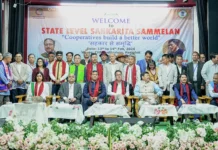[ Weins Bhir ]
Wealth corrupts the rich and the poor alike, the former by possession and the latter by envy.
– Jean-Jacques Rousseau
Arunachal has become an economic greenhouse, with money having an opium effect on the masses as never before, owing to its strategic location. Under crony capitalism, we are watering a money culture so deeply ingrained in our socio-politics that it no longer provokes shock. Instead, we endure and adjust rather than resist. In this capitalist outgrowth, money has become central to identity and value because it ties survival and status to income.
Jokes like ‘iPhone aunty’ and ‘Scorpio uncle’ aren’t just memes; they are the tip of a greater iceberg – the iceberg of status-driven classism. Since opportunity is built not on merit but on money or connections, the most profitable professions in Arunachal for men, other than politics, have become student leadership, engineering, or a contractor, terms that are now almost synonymous. These shackles of a classist society plagued with corruption can only be broken not by political will but by an informed public with collective will that understands that injustice anywhere is a threat to justice everywhere.
In the race towards a developed Arunachal, this essay is both a call for moral urgency and a reminder that money culture intertwines with corruption, patriarchy, unemployment, substance abuse, and more. As the saying goes, Capitalism digs its own grave. For a consumer, society is strengthened by the weakness of its subjects because money does not merely buy cars and influence; it buys silence, votes, and the erosion of our collective will. Therefore, we blame the system, while we are the system.
The nickname of Arunachal- the land of dawn-lit mountains – now has a better half – the land of ‘khushi marzi’. With an incredible jump of evolutionary stages of development instead of a linear shift, the preface of which can be traced to the journey of student organisations that began as a civic responsibility and a voice against the undemocratic social order and evil practices in Arunachal. They began not only as the voice of the students but also as the voice of every indigenous people of Arunachal. These organisations, which once stood as the only veto power and quasi-opposition to the ruling government, have now eroded, choosing to appease rather than confront those in power.
With the legitimate absence of an opposition, we have become a democracy with no opposition, losing both the trust and faith of the people. This hopelessness has yielded classist and elitist student politics where ‘real’ students are excluded not on the basis of their potential but the class they belong to. The already established older candidates, or ‘nepo’ candidates, are disguised as students. Their financial eligibility to buy votes from disenchanted students results in a market of sellers and buyers. Participants in this market become agents of a blunder, the blunder of blending corruption with classism. Its ripple effects are felt everywhere, from top to bottom. Only when headlines like the APPSC paper leak scam emerge do we awaken our collective consciousness, realizing that we have become slaves of money, having already paid for money’s liberty with our own.
Similarly, access to easy money is blurring the lines of inequality between the common mass and leisure classes, creating an illusion of equality while deepening long-term inequality. This short-lived equality doesn’t offer real freedom or social mobility. It blinds people, locking them into a comfortable capitalist mindset. The paradox between access to higher standards of living in terms of fluctuating, temporary material goods, and access to long-term life-sustaining assets like education, healthcare, and infrastructure, illustrates this clearly. Ever wondered why an iPhone is more accessible than a good educational institute? Are we to rot as a consumer society, poor in quality if not in quantity? Easy money gives the common masses a better standard of living without offering stability.
Meanwhile, the leisure class secures stability and can easily bypass a flawed system of broken roads, healthcare, and educational institutions. Thus, when we trade our future for a convenient ‘now’ instead of a convenient ‘tomorrow’, we rob ourselves of complaining about poor roads, health cases being referred to other states, or the constant need to send our children elsewhere for education. If the realization of this poor bargain does not question the misspelling of demagoguery into democracy, it testifies that the day people stop questioning is the day it begins collapsing.
Classism within patriarchy is another collective compliance we owe to the systemic ruins of Arunachal. Here, a rich man with several wives is applauded and fantasized in the name of preserving culture, rather than condemned as corrupting it. When Ninong Ering introduced the Arunachal Pradesh Monogamy Election Eligibility Bill 2023, its political sidelining to spare legislators with multiple wives from embarrassment was the loudest, most unapologetic form of patriarchy, united by class and gender. This stagnant water cradles families of trauma-bearing wives and children, as well as unmarried middle-class or so-called lower-class men, where the privilege of one becomes the burden of another.
As the saying goes, Energy can neither be created nor destroyed; it can only be transformed from one form to another. Likewise, individual burdens are transformed from personal distress into social distress, and personal becomes political. These social distresses are recycled by opportunists of easy money, commodifying suffering. The surge in substance abuse and HIV cases in Arunachal stands as a testimony.
Ironically, these victims are often stigmatized and criminalized. We punish the very victims of a system we have created, preaching a biased morality while denying responsibility. In doing so, we betray our collective conscience with double marginalisation through emotional trauma. We replace care and rehabilitation with judgement and exclusion. And when systems meant to protect us also prioritize profit over people, the illness of capitalism wins. As soon as this system fails its people, the breach of trust pushes them away from honest paths to success, furthering systemic failure.
An ethical shift in the behavioral conventions of the masses, therefore, stands like the promise of good roads, long delayed but necessary. We have surrendered to money culture so much that, even more than identity-based politics, Arunachal suffers from chronic identity-trade politics. A society that once took pride in never being fully colonized is now colonized by enlightenment’s individualism, contrasting to our indigenous value systems. But just as Rome didn’t collapse in a day, neither did our systemic failures. They persist when we sell our votes; when RTI turns from Right to Information into Right to Income (as cited by Ninong Ering); when educational institutions have fewer seats than deserving students; when the bridge between talent and opportunity is built not on merit but on money or social capital; and when we refuse to take responsibility for the dead bodies beneath us, bearing the consequences of our individualistic opportunism.
Most tragic of all is the burial of ecological consciousness in the coffin of our indigenous faiths, leading to environmental apartheid. That is when we realize we are already living in a Rome of our own making, crumbling not from an enemy, but from the termites we feed within. We must understand that when we compromise with corrupt habits, we are compromising our future. The foundation of every great civilization was built not only on intellectual progress but also on moral progress.
Therefore, the only sustainability that capitalism offers is discontent and lack of sustainability itself, whereas the ‘middle path’ of contentment and sustainability is the closest path towards rectifying moral urgency in the age of the Anthropocene.
Accountability remains a vital hope for witnessing a generation ready to claim responsibility and fulfill the duty that every right entails, transcending victim mentality. Can you think of the ways we can change our corrupt habits for a better tomorrow? After all, Rousseau also says, “As soon as public service ceases to be the main business of citizens and they prefer to serve with their purses rather than their persons, the state is already near to its ruins.” (The contributor is a 4th year student of Lady Shri Ram College for Women, DU)


